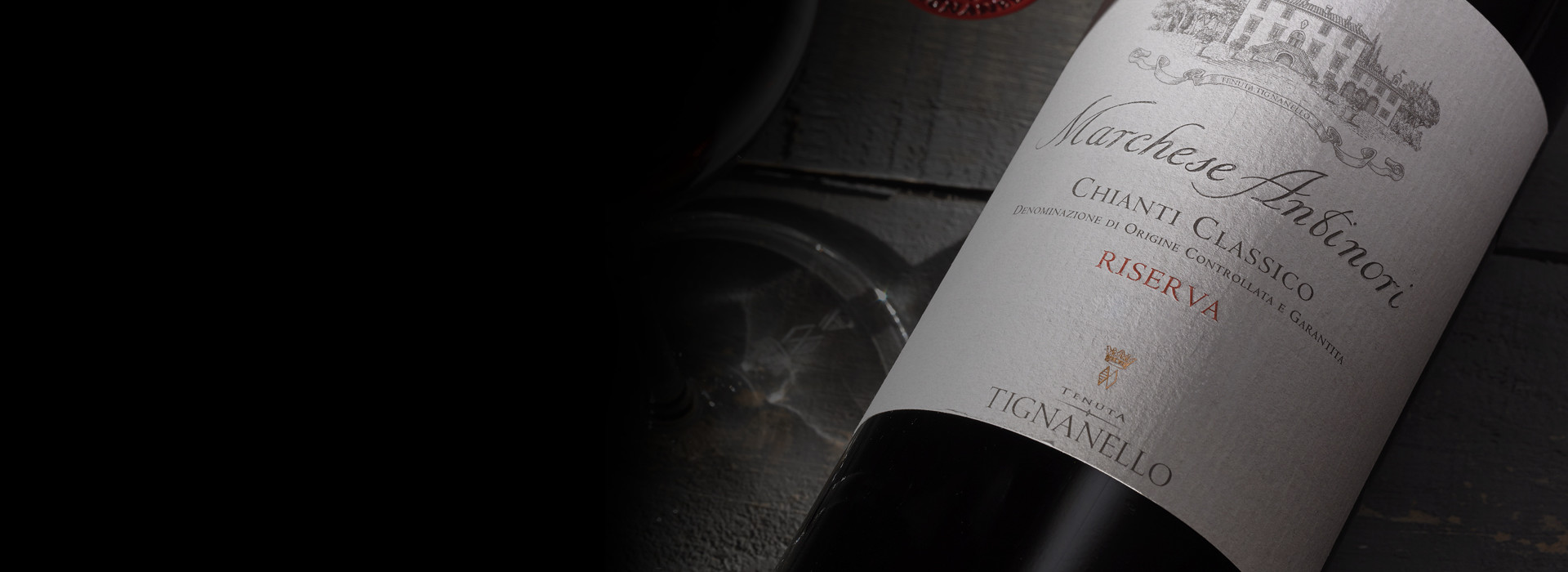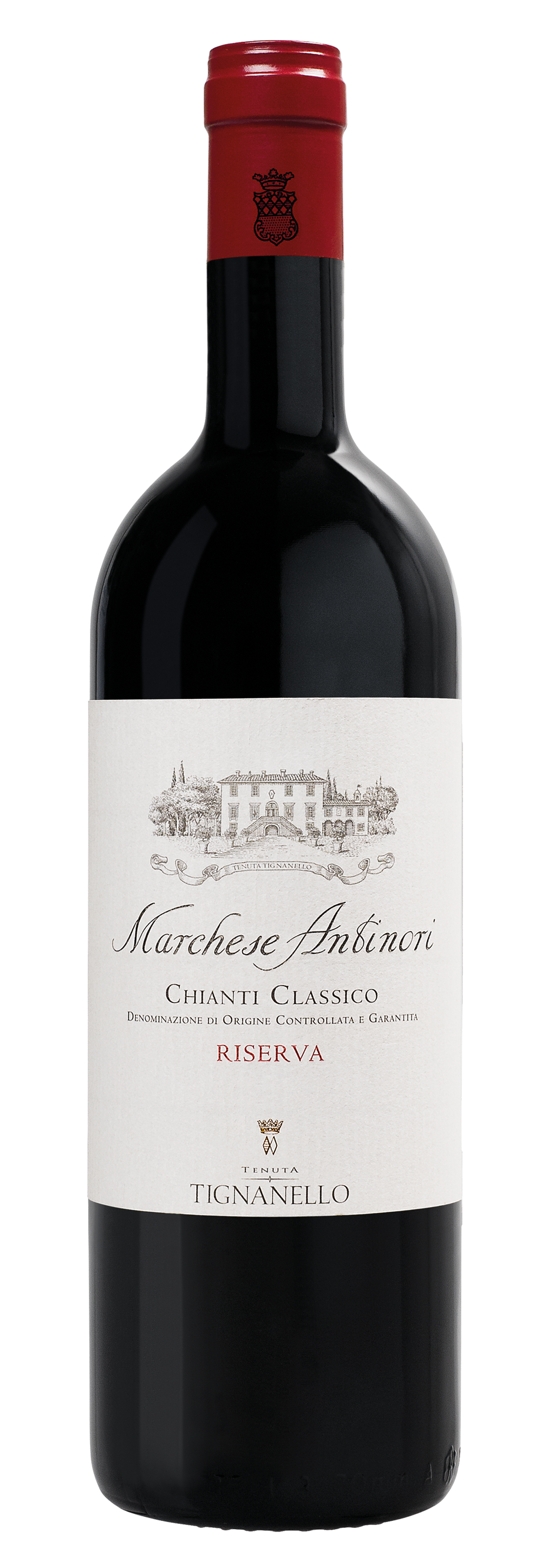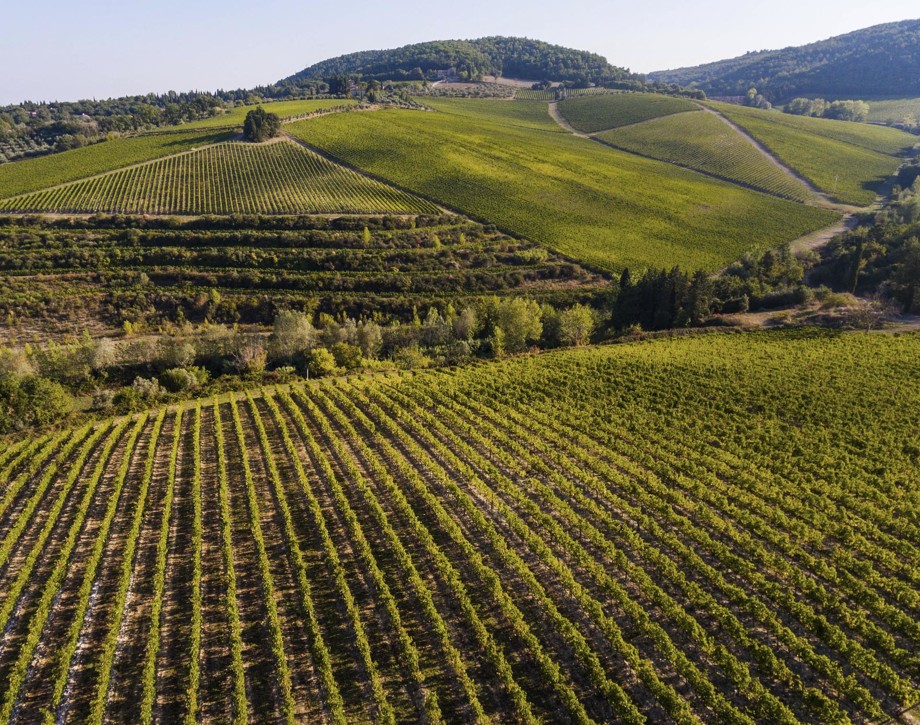Marchese Antinori

Climate
The winter of 2014 was characterized by mild weather with temperatures slightly above seasonal averages. This led to an early bud burst for the Sangiovese grapes and the other complementary varieties. Spring was also mild and dry, leading to a positive flowering and bud set. The summer, a bit unstable in its weather, slowed the processes of color change and ripening, which came back into balance, however, during the first part of September thanks to days of warm and sunny weather. The harvest took place between mid-September and early October.
Vinification
Upon arriving in the cellars, the grape bunches were destemmed and the berries carefully selected on sorting tables before being delicately pressed to fully conserve the typical components and aromas, so important for the Sangiovese variety. The must, once in the stainless steel fermentation tanks, was macerated on its skins and worked with soft techniques to guarantee and extraction which was both intense and also controlled to assure elegance and softness of structure. The fermentation lasted approximately week, after which the wine remained in contact with its skins for a further nine to ten days. After being run off its skins, the wine went into 60 gallon oak barrels, coopered principally from French oak, where, by the end of the year, it went through a complete malolactic fermentation. The wine was then racked and blended and aged in French and Hungarian oak barrels for approximately a year. It was then bottled and given an additional twelve months of bottle aging prior to release.
Historical Data
The Tignanello estate is located in the heart of the Chianti Classico production zone, nestled between the valleys of the Greve and Pesa rivers, and extends over close to 800 total acres (319 hectares), some 130 of which (415 hectares) are planted to vines. The vineyards consist principally of the native Sangiovese grape along with such non-traditional varieties as Cabernet Sauvignon and Cabernet Franc. The Marchese Antinori is an historic wine of the Antinori cellars which, since 2011, is produced from the grapes of the Tignanello estate. It is a wine which presents itself as the full expression of the quality and elegance of the Sangiovese of this part of Tuscany.
Tasting Notes
An intense ruby red in color, the wine offers a fruity and floral nose with additional notes of spices and toasted oak. The palate is supple and balanced and the toasty and fruity sensations linger on a fragrant and persistent finish.

The Wine
This Antinori family’s historic label, since the 2011 vintage Marchese Antinori has been produced with grapes exclusively from the Tignanello vineyard. It’s made almost entirely with Sangiovese with a small percentage of other complementary varieties. A wine that fully expresses the quality and elegance of Sangiovese grapes grown in this area.

Climate
The winter of 2014 was characterized by mild weather with temperatures slightly above seasonal averages. This led to an early bud burst for the Sangiovese grapes and the other complementary varieties. Spring was also mild and dry, leading to a positive flowering and bud set. The summer, a bit unstable in its weather, slowed the processes of color change and ripening, which came back into balance, however, during the first part of September thanks to days of warm and sunny weather. The harvest took place between mid-September and early October.
Vinification
Upon arriving in the cellars, the grape bunches were destemmed and the berries carefully selected on sorting tables before being delicately pressed to fully conserve the typical components and aromas, so important for the Sangiovese variety. The must, once in the stainless steel fermentation tanks, was macerated on its skins and worked with soft techniques to guarantee and extraction which was both intense and also controlled to assure elegance and softness of structure. The fermentation lasted approximately week, after which the wine remained in contact with its skins for a further nine to ten days. After being run off its skins, the wine went into 60 gallon oak barrels, coopered principally from French oak, where, by the end of the year, it went through a complete malolactic fermentation. The wine was then racked and blended and aged in French and Hungarian oak barrels for approximately a year. It was then bottled and given an additional twelve months of bottle aging prior to release.
Historical Data
The Tignanello estate is located in the heart of the Chianti Classico production zone, nestled between the valleys of the Greve and Pesa rivers, and extends over close to 800 total acres (319 hectares), some 130 of which (415 hectares) are planted to vines. The vineyards consist principally of the native Sangiovese grape along with such non-traditional varieties as Cabernet Sauvignon and Cabernet Franc. The Marchese Antinori is an historic wine of the Antinori cellars which, since 2011, is produced from the grapes of the Tignanello estate. It is a wine which presents itself as the full expression of the quality and elegance of the Sangiovese of this part of Tuscany.
Tasting Notes
An intense ruby red in color, the wine offers a fruity and floral nose with additional notes of spices and toasted oak. The palate is supple and balanced and the toasty and fruity sensations linger on a fragrant and persistent finish.

Tenuta Tignanello
The Tenuta Tignanello estate is in the heart of Chianti Classico, in the gently rolling hillsides between the Greve and Pesa river valleys. It extends over an area of 319 hectares (788 acres), of which about 165 (407 acres) are dedicated to vines. Two of the estate’s prized vineyards are on the same hillside, Tignanello and Solaia, on soils that originated from marine marlstone from the Pliocene period rich in limestone and schist.
Soil
Calcareous rocky soils with alberese (marl limestone) and marl.


















